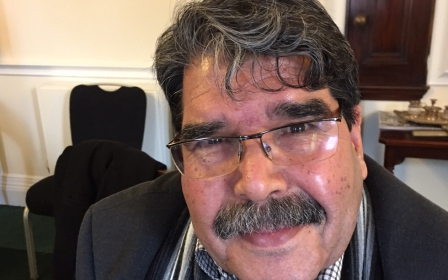Turkey blames Syrian government for deadly attack on Turkish soldiers

ISTANBUL, Turkey – The Turkish military said Syrian government forces were behind the attack that killed three Turkish soldiers and wounded 10 others in northern Syria early on Thursday.
"It has been evaluated that an air attack carried out by the Syrian government around 3.30am local time on 24 November resulted in the martyrdom of three of our heroic comrade in arms and 10 of our heroic comrades in arms have been injured, one seriously," the Turkish Armed Forces said in a statement posted on their website.
The prime ministry slapped a broadcasting ban on coverage of the strike an hour after the military's statement, Turkey's broadcast watchdog said on its website.
The prime minister, Binali Yildirim, however, addressed the attack, warning that it would not "go unanswered".
"It is clear that in this region some people were unhappy with Turkey’s fight against Daesh," he said, using an Arabic acronym for Islamic State group.
The attack marks the first direct reported confrontation between Turkish and Syrian government forces since Turkey launched the Euphrates Shield military incursion into northern Syria in late August.
Turkey-backed Free Syrian Army rebels led the charge, raising fears of escalating an already fierce conflict. The stated intention of the mission is to clear border areas on the Syrian side of groups that pose a threat to Turkey.
Kemal Kilicdaroglu, chairman of the opposition Republican People’s Party (CHP), warned the government to keep a calm head.
"The air attack on operation Euphrates Shield can drag us into a very dangerous process. The government should act with calm," he said.
Meanwhile, a media gag order was issued preventing any news of the attack from being broadcast.
Will Ankara-Moscow relations come under threat?
Thursday’s incident marks the first direct conflict since 22 June 2012, when the Syrian air force shot down a Turkish Phantom F-4 reconnaissance jet for allegedly violating Syrian air space.
The Turkish administration is an avowed enemy of the Syrian government and has repeatedly called for the ouster of Bashar al-Assad, accusing him of massacring his own people.
Until the incursion, Ankara’s role in the Syrian conflict was limited after Turkey shot down a Russian jet exactly one year ago.
A rapprochement between Ankara and Moscow that began in late June allowed Turkey to implement its operation without fear of Russian retaliation.
But direct confrontation between Turkish forces and Syrian government troops backed by Russia could now strain relations between Ankara and Moscow.
In addition, Turkey’s military operation has only limited backing from the US, Ankara's main ally. After Turkish-led forces took the border town of Jarabulus early on in the campaign, US officials said they didn’t sanction any moves further south.
Ankara, however, has vowed to continue to push ahead and ensure that all threats it faces are eliminated. It also hopes to be able to establish a de facto safe zone where refugees fleeing the ongoing conflict can stay instead of crossing into Turkey.
Turkey seeks to deal with Syrian-Kurdish forces
Reports during the past week indicated that the Turkish-led operation was advancing on the town of al-Bab, the site of Thursday’s attack. Turkish officials have said their goal is to clear the area of both Islamic State militants and also of Syrian-Kurdish forces, both of which Ankara designates as terrorist and posing a direct threat to Turkey.
Ankara also wants to ensure that the Syrian Kurdish Democratic Union Party (PYD) is unable to create a corridor linking the areas under its control and cutting Turkey’s direct access to other groups in Syria.
As recently as Tuesday, Turkish President Recep Tayyip Erdogan vowed that after taking al-Bab, the operation would advance toward Manbij where it believes People's Protection Units (YPG), the military force of the Democratic Union Party, is nestled.
The US had promised Ankara that YPG forces would withdraw to the east of the Euphrates river after Manbij was secured. But Ankara has said the promise hasn’t been kept and that it will take unilateral military action if necessary to push the YPG out of Manbij.
Turkey views the PYD and YPG as the Syrian wing of the Kurdistan Workers’ Party (PKK), with which it has been engaged in a 32-year conflict. The PKK is designated as a terrorist organisation by Turkey, the US and the EU. However, the US and the EU have not designated the PYD and YPG as terrorist.
This article is available in French on Middle East Eye French edition.
Stay informed with MEE's newsletters
Sign up to get the latest alerts, insights and analysis, starting with Turkey Unpacked
Middle East Eye delivers independent and unrivalled coverage and analysis of the Middle East, North Africa and beyond. To learn more about republishing this content and the associated fees, please fill out this form. More about MEE can be found here.




